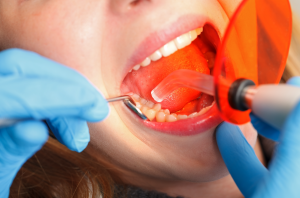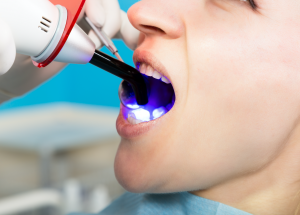 Dental bonding is a common procedure in which composite resin is applied to a tooth in need of a cosmetic repair, such as on teeth with chips, gaps and stains. It is typically a simpler and less expensive dental cosmetic procedure than veneers, fillings and crowns and, in most cases, a completely painless dental restorative technique.
Dental bonding is a common procedure in which composite resin is applied to a tooth in need of a cosmetic repair, such as on teeth with chips, gaps and stains. It is typically a simpler and less expensive dental cosmetic procedure than veneers, fillings and crowns and, in most cases, a completely painless dental restorative technique.
At Lockhart Dentistry in Indianapolis, you can rely on us to provide you with the facts pertaining to dental bonding and help you decide if it is the right solution for your oral health needs. Most people resist dental procedures as they can be painful, but we’ll be able to assess you and your individual smile to help determine if your dental bond will be a pain-free experience, as most are.
Is dental bonding right for me?
Dental bonding may be right for you if you have a tooth with an imperfection that makes you feel uncomfortable with your smile. Maybe you have a tooth or multiple teeth that are discolored from years of sipping coffee. Or perhaps you dislike that you have a tooth that is shorter than others, causing an uneven smile. It may also be time for you to address a decayed tooth. Dental bonding is a quick and simple solution for these and other flaws you may perceive with your teeth.
Unlike other dental restorative techniques, such as amalgam fillings, veneers and crowns, dental bonds are often a less painful dental restorative option, as well as less expensive and simpler to undergo.
Dentists typically recommend dental bonding procedures for these reasons. If the tooth that needs a cosmetic repair is in a low-bite area, such as your front teeth, your dentist may further recommend dental bonds, since your front teeth are least likely to be used for chewing food and are often the easiest to care for when preventing stains.
What is the dental bonding process?
The dental bonding process is simple and typically requires only a few steps.
Your dentist will start by using a shade guide to find the correct composite resin color that matches your natural tooth color. The tooth in need of the dental bond will then be roughened to make it easier to affix the resin. Next, an adhering agent is applied, followed by the dental bond composite resin itself. Your dentist will then mold and shape the resin as needed to help it match the natural shape of your teeth. An ultraviolet light or laser is used to harden the composite resin. Finally, your dentist will further mold and polish the tooth to ensure it matches the look of your other teeth.
This whole process takes only about 30 to 60 minutes per tooth. And unless your dental bonding procedure requires the use of anesthesia, there is no downtime. You can return to work and your regular lifestyle right after your dental bond is placed.
How much pain is involved with dental bonding?
Any pain experienced during the dental bonding procedure depends on the location and the state of the tooth that needs the bond. The process for applying most dental bonds is completely painless since the dentist is usually only working on the surface of the tooth.
You may only experience pain if your bond is used to repair a cavity. Since a cavity is decayed tooth matter, you may feel a sense of discomfort when the composite resin is inserted at the site of the cavity, where the decay may be invading sensitive nerve endings.
Additionally, pain can sometimes be felt if your bond is being applied to an area of the tooth near the gums, where vulnerable nerves and tissue are present. Your dentist may recommend a topical anesthetic or pain killer be taken before the procedure, depending on your level of sensitivity and any decay present near the site of the pending dental bond.
For the most part, patients who have undergone a dental bond find that the level of pain experienced during the procedure is minimal to nonexistent, with their pride in the result outweighing the discomfort felt while the bond is being placed.
 What is the recovery process after I have a dental bonding procedure?
What is the recovery process after I have a dental bonding procedure?
If you opt for an anesthetic prior to your procedure, you will likely need recovery time following the placement of the dental bond. If any pain or discomfort is detected, your dentist may recommend taking a pain killer following the procedure.
You may wish to avoid smoking or sipping on wine or coffee, especially for the first 48 hours after having a dental bond. This is especially true if you had a bond placed to correct tooth stains, as these items can easily stain new composite resin.
As always, good oral hygiene is the key to keeping your dental bond looking great and recovering to perfection. Ensure you brush your teeth twice a day and floss daily to continue to enjoy your pristine dental bond.
Can Lockhart Dentistry ensure a comfortable dental bonding experience?
Yes, Lockhart Dentistry can absolutely make your dental bonding experience comfortable. We take individual needs into concern and do everything we can to make sure your dental bonding procedure is quick and as pain-free as possible.
If you’re interested in discussing having a dental bond procedure, please contact our office at 317-849-9715 today and we’ll be happy to assist you.
You can also use our simple online appointment portal to request an appointment and consult Dr. Lockhart and his team in person.



